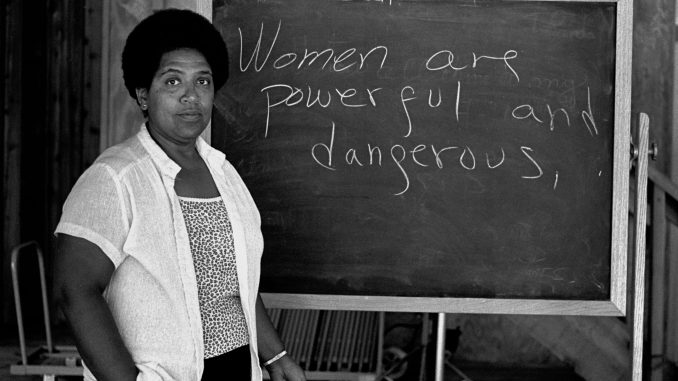
Paige Welch, Staff Writer |
Audre Lorde is perhaps one of the most influential voices in activism. She was a feminist writer, poet, and essayist focusing on the unique intersectional perspective of being a black lesbian woman during a time when the dialogue mainly revolved around the experiences of white straight women.
Lorde was born on February 18, 1934 in New York City to two Caribbean immigrants. Living in Harlem during the early twentieth century exposed her to the inequalities of race, class, gender, and orientation. Due to a rocky and distant relationship with her parents, she turned to poetry as a way to communicate and express her emotions.
Throughout her teen and young adult years, she dedicated a lot of time to both academic and social education, spending one pivotal year at the National University of Mexico, which she credited for contributing to the strength of her identity as both a poet and a gay woman. She then attended Hunter College after returning to New York, graduating in 1959.
During this time, she found herself participating in the gay culture of Greenwich Village before getting a Master’s degree in Library Sciences from Columbia University. In 1968, Lorde was a writer-in-residence at Tougaloo College. Through interacting with her young undergraduate students, oftentimes students of color, she became aware and passionate about all of the oppressions in society women of different backgrounds had to face on a daily basis. She published a book of poems titled “Cables to Rage” during this time, emphasizing the use and craft of her poetry to explore social issues.
In 1984, Lorde started a visiting professor fellowship at The Free University of Berlin. Here, she helped coin the term “afro-German” to give name to a community similar to the African American community in the States. During the sixties, her poems were often published in independent publications. She worked in multi-faceted genres to reflect the complexity of her identity. After the publication of a volume of works titled “Coal” in 1976, she secured a respectable position within The Black Arts Movement, which exposed her work to a wider audience.
In the area of gender theory and activism, she is considered a pioneer of “intersectional feminism,” a fairly recent subset of women’s studies that explores all of the conditions in a person’s life that affect how they are viewed by society. In her case, being black, gay, and a woman made her existence more of a challenge than it would be for the average American citizen.
But as a theorist and a person shrouded in academic thought, she did not limit her discussions to just her own perspective. She wrote a lot about erotica as it relates to femininity and also explored the differences of men and women beyond just a simple claim of “biology.” In a short 58 years, Audre Lorde was able to stake a claim in an already occupied territory. Her voice has been speaking for the voiceless by giving them the words to express their anger.
She famously wrote: “Only by learning to live in harmony with your contradictions can you keep it all afloat.”
It is a call for women of color to love themselves and their complexities, even when it seems like the world won’t.
Leave a Reply